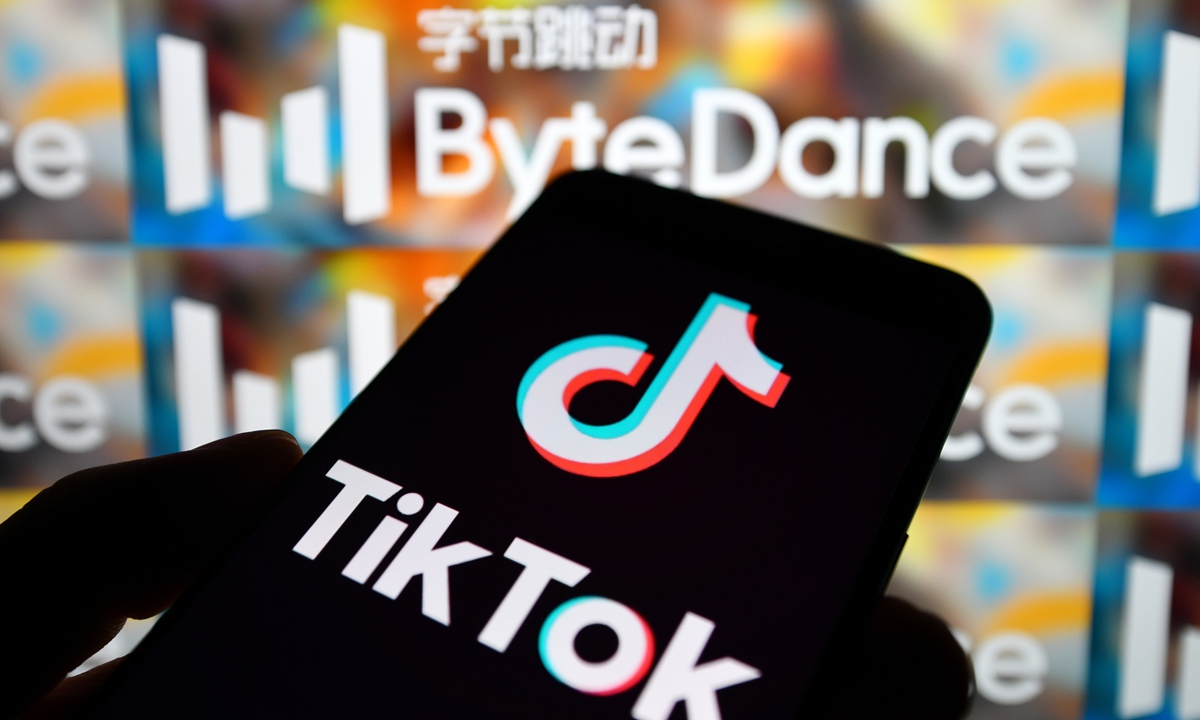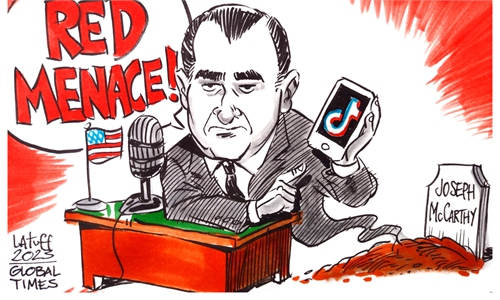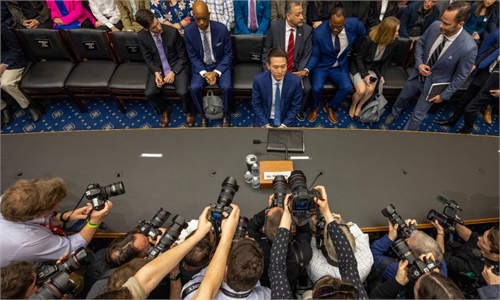
TikTok Photo: VCG
One thing was widely anticipated before TikTok CEO Shou Zi Chew testified before the US Congress, and then verified on Thursday: that the hearing was nothing more than xenophobic political grandstanding and that nothing will change Washington's attempt to seize an incredibly popular mobile app, just because it is owned by a Chinese firm and is beating US social media giants in their home market fair and square.
Following the high-profile hearing, top headlines in US media claimed that Chew failed to "sway" the US Congress and that the US Congress "seems more determined to ban TikTok than ever." That should be no surprise for anyone. After all, the so-called hearing was a mere formality in the US government's assault on the successful app. At the hearing, US lawmakers made it unmistakably clear that they were not at all interested in what Chew had to say about the firm's efforts to address security concerns. They showed up just for the political showboating.
During the roughly five hours, US lawmakers took turns to compete over who has the most scathing and toughest lines to attack TikTok and China. The theme was clear from the outset. "Your platform should be banned," said Cathy McMorris Rodgers, chair of the US House of Representatives' Energy and Commerce Committee, which held the hearing, at the very beginning. Later in the session, when Representative Kat Cammack used up all his time to criticize TikTok and left no time for Chew to respond, Chew asked McMorris Rodgers if he could respond. "No. We're going to move on," she said. That pretty much sums up how big a sham the entire hearing was.
Still, the ugliness of the proceedings at the hearing does not even compare the ill intentions behind them. Underneath all the political theatrics is Washington's multi-year plot to not only ban TikTok but actually force it to be sold to a US company. As early as in August 2020, then US President Donald Trump tried and later failed to force the sale of TikTok to a US buyer. The Biden administration now appears keen to complete what Trump started. It has recently moved to ban the app on government-issued devices. In recent weeks, it delivered a demand to TikTok to sell itself to a US firm, the New York Times reported on March 15. This is robbery, pure and simple.
Yet, if the US government thinks it can seize a successful app at will, it clearly overestimated its power. Notwithstanding its status as the world's superpower, the US government can't just grab things it likes, especially when it undermines the national interests of another country.
On Thursday, China's Commerce Ministry said it firmly opposes to a forced sale of TikTok, which is owned by Beijing-based ByteDance. "The sale or divestiture of TikTok involves the issue of technology export, and administrative licensing procedures must be performed in accordance with Chinese laws and regulations, and the Chinese government will make a decision in accordance with the law," Shu Jueting, a spokesperson for the ministry, said at a press conference.
In fact, since Trump first tried to force the sale of TikTok to a US buyer in 2020, China has taken concrete steps that would prevent such a forced sale. Shortly after news of Trump's plot in August 2020, China's Ministry of Commerce and the Ministry of Science and Technology added 23 items that are subject to the country's export restrictions. They include "personalized information push service technology based on data analysis" and "artificial intelligence interactive interface technology," which would cover a potential TikTok deal. More recently, in December 2022, the ministries released a revised catalogue of technologies that are subject to export bans or restrictions, and "personalized information push service technology based on data analysis" was still listed.
The ministries made it clear that the export bans or restrictions are aimed at protecting China's national security and the broader public interest. Listing algorithm and other technologies that are crucial to TikTok's success in the catalogue means such exports or forced sale in the case of TikTok could undermine China's national security and interest. No country would sit idly while its national interests are damaged. So, to politicians in Washington: you can put on as many as political shows as you want, and you may even decide to ban the app within your borders, but don't even think about seizing it.
Finally, the utter disrespect and disdain US lawmakers showed to Chew, who was clearly well prepared but faced an impossible task, offers a sobering lesson for not just Chinese firms but also businesses from around the world: Do not trust the US system as US politicians describe it, when you are leading in your field and the US is after your business, nothing is off the table.
The author is a reporter with the Global Times. bizopinion@ globaltimes.com.cn



